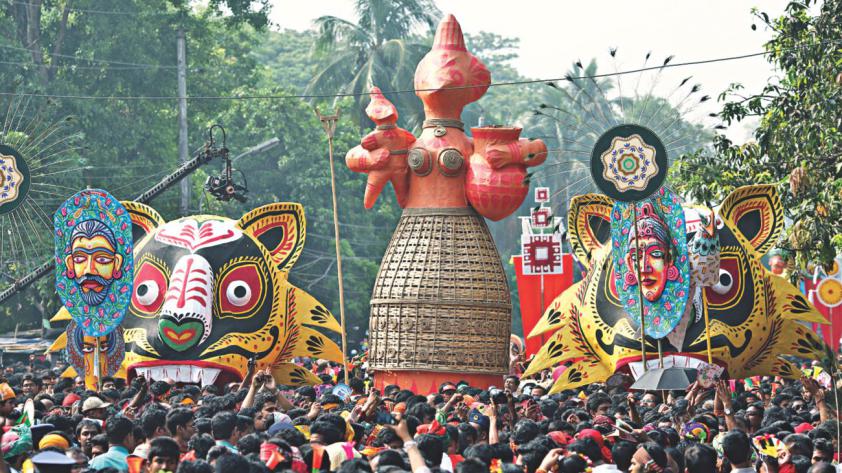Cherishing Tradition
Written by: Lubna Marium
Posted on: Sunday 17th of April 2016 2:38:13 PM

A dancer, researcher, and cultural activist, Lubna Marium has a portfolio that will amaze anyone; even the most qualified of people. She is the General Secretary and Artistic Director of "Shadhona- A Centre for Advancement of South Asian Culture." She actively participates in activities of various cultural organizations, and is also a member of the International Federation for Theatre Research and a partner of the Indo-Bangla Cultural Initiative. She is one of the most respected individuals in the cultural arena of Bangladesh and South Asia, and Star Showbiz is humbled to have her contributions as a columnist in our weekly feature. Boishakh brings with it the scent of new beginnings and of renewed hope. So what better time to start reflecting, start 'gazing', on the multifarious cultural practices of this land that we live in? The entire enterprise of the 'gaze' has excited theorist for years. To gaze is to 'look steadily and intently at something, especially at that which excites admiration, curiosity, or interest'. This mundane description becomes dynamic as soon as we acknowledge the fact that the 'gazer' is also 'gazed back at'. It has been said that 'the most powerful human forces are found in the meeting of the face and the gaze. Only there do we exist for one another. In the gaze of the other, we become, and in our own gaze others become. "Boishakh begins with an 'utshob', a celebration. But then, what are celebrations?" Tagore very eloquently states, 'A celebration is that time when, through a meeting of spirits, we acknowledge an undivided Truth, the very same Truth that we disregard in everyday life due to the distractions of greed and desire'. Celebrations are threshold spaces; neither here nor there, just 'in-between'. Very interesting spaces, these - spaces of unlimited freedom. These are spaces that allow us to discard greed; allow us to be whatever we dare to be. And, very readily, we cast aside the structures of identity and become one - a people enjoined by cultural practices. Lest we forget, this celebration has come down to us through enormous struggle. A couple of generations battled, on the streets, for their right to cultural freedom, culminating in the glorious Liberation War of 1971. But, today, forty-five years down the lane, we need to 'gaze' at our gains and losses. Yes, cultural practices have enabled us, as a nation, to fairly successfully thwart radicalization and fundamentalism, but we cannot deny the fact that we stand on fragile ground, made more fragile by politics and greed. How does one, then, resurrect ethics and morality? 'Moral knowledge...is not simply intellectual grasp of propositions; it is not even simply intellectual grasp of particular facts...It is seeing a complex, concrete reality in a highly lucid and richly responsive way; it is taking in what is there, with imagination and feeling '. That the pursuit of the arts enhances the capacity to imagine has been accepted by one and all. The faculty of imagination, in turn, empowers moral reasoning. How fortuitous that Bangladesh has an in-built history of the public pursuit of arts through our secular festivals. When the world is searching for ways and means to inculcate cultural intervention within public spheres, we in Bangladesh already possess the resources to do so. This is the time to cherish it and strengthen it. We often hear the new generation lamenting the fact that they were not part of the liberation war in 1971. I would like to tell them, they are now part of an even tougher war for freedom - freedom to think, freedom to choose, freedom to dissent. Today, let us, therefore, celebrate our gains and through this celebration diminish our losses. 'Shubho Noboborsho 1423!' The author is a Dancer, Researcher and Cultural Activist
Leave a Comment:
Read what others says about us
- documenting for posterity
- performing transformation
- cherishing tradition
- the body speaks anew
- in conversation with two shadhona dancers
- gidree bawlee: empowerment through art
- in conversation with shadhona dancer sinthia yasmin nupur
- don’t hold your breath!
- #freetagore
- history of rhythm, in pixels
- of monsoons, myths and manasa
- culture: the present site for struggle
- the art & politics of documentation
- and, theatre strikes back!
- lest we forget: atiśa
- dancing away boundaries
- dance-why?
- haha
- hhh
- heked
Advertisement #1

Advertisement #2

Advertisement #3
